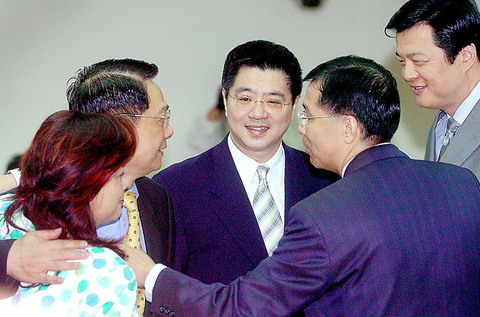Within a span of eight months, Cho Jung-tai (卓榮泰) was promoted from DPP lawmaker to deputy secretary-general of the Presidential Office in May of last year. He has since been promoted again, and will assume the position of Cabinet spokesperson on Feb. 1.
Cho, seen as the top aide and long-time follower of incoming premier Frank Hsieh (

PHOTO: YEH CHIH-MING, TAIPEI TIMES
"Viewing Cho as merely Hsieh's man is not entirely true," said an official with the Presidential Office who asked not to be named.
"President Chen Shui-bian (
In last year's presidential campaign, Cho served as deputy manager of Chen and Vice President Annette Lu's (呂秀蓮) campaign.
Cho's main job was to integrate support of pro-DPP local factions, seek grassroots votes and even solicit support from the opposition, said the official.
"Cho accomplished his job with high efficiency, which met Chen's expectations," the official said. "He therefore won the trust of the president. To cultivate young talent, the president decided to quickly promote Cho," he added.
Noting his hard-working nature, Cho once said "I lost 7kg in three months during the [presidential] campaign."
However, unavoidably, Cho, who still refers to Hsieh as "teacher" in person, has been benefiting from Hsieh's endorsement.
Cho, 49, earned a bachelor's degree in law from National Chunghsing University. During the 1980s, he worked as Hsieh's assistant when Hsieh served as a Taipei City councilor and then as a legislator. Cho's job at the time was to preside over constituency services and campaign activities.
He then served two terms as a Taipei City councilor from 1990-1998 and two terms as a legislator from 1998 to last year.
In 2001, when President Chen became chairman of the DPP and reformed the party, he appointed many young politicians to head the party's departments.
Cho became the head of the party's social development department, taking responsibility for grassroots organization nationwide.
After the presidential inauguration last May, Cho was nominated by Chen as deputy secretary general of the Presidential Office.
Serving as Chen's assistant, Cho's job was to look after domestic affairs, which involved integrating Presidential Office activities with those of civil groups.
In addition, he was also in charge of Chen's local visit itinerary, and assisted him in communicating with academics and other influential people of different fields.
"Since the job suited Cho's background and experience, he did very well," said chairman of the Council of Hakka Affairs and a close friend of Cho -- Luo Wen-jia (
When leaving the presidential office, Cho told reporters "I always keep alert and often sleep in office because Chen or Vice President Lu could need me any time."
Cho also told reporters "I would like to be an MP3 player as Cabinet spokesman," meaning that the government, like music, should communicate with the public in a soft and enjoyable tone, rather than a harsh one.

Chinese Nationalist Party (KMT) Chairman Eric Chu (朱立倫), spokeswoman Yang Chih-yu (楊智伃) and Legislator Hsieh Lung-chieh (謝龍介) would be summoned by police for questioning for leading an illegal assembly on Thursday evening last week, Minister of the Interior Liu Shyh-fang (劉世芳) said today. The three KMT officials led an assembly outside the Taipei City Prosecutors’ Office, a restricted area where public assembly is not allowed, protesting the questioning of several KMT staff and searches of KMT headquarters and offices in a recall petition forgery case. Chu, Yang and Hsieh are all suspected of contravening the Assembly and Parade Act (集會遊行法) by holding

PRAISE: Japanese visitor Takashi Kubota said the Taiwanese temple architecture images showcased in the AI Art Gallery were the most impressive displays he saw Taiwan does not have an official pavilion at the World Expo in Osaka, Japan, because of its diplomatic predicament, but the government-backed Tech World pavilion is drawing interest with its unique recreations of works by Taiwanese artists. The pavilion features an artificial intelligence (AI)-based art gallery showcasing works of famous Taiwanese artists from the Japanese colonial period using innovative technologies. Among its main simulated displays are Eastern gouache paintings by Chen Chin (陳進), Lin Yu-shan (林玉山) and Kuo Hsueh-hu (郭雪湖), who were the three young Taiwanese painters selected for the East Asian Painting exhibition in 1927. Gouache is a water-based

Taiwan would welcome the return of Honduras as a diplomatic ally if its next president decides to make such a move, Minister of Foreign Affairs Lin Chia-lung (林佳龍) said yesterday. “Of course, we would welcome Honduras if they want to restore diplomatic ties with Taiwan after their elections,” Lin said at a meeting of the legislature’s Foreign Affairs and National Defense Committee, when asked to comment on statements made by two of the three Honduran presidential candidates during the presidential campaign in the Central American country. Taiwan is paying close attention to the region as a whole in the wake of a

OFF-TARGET: More than 30,000 participants were expected to take part in the Games next month, but only 6,550 foreign and 19,400 Taiwanese athletes have registered Taipei city councilors yesterday blasted the organizers of next month’s World Masters Games over sudden timetable and venue changes, which they said have caused thousands of participants to back out of the international sporting event, among other organizational issues. They also cited visa delays and political interference by China as reasons many foreign athletes are requesting refunds for the event, to be held from May 17 to 30. Jointly organized by the Taipei and New Taipei City governments, the games have been rocked by numerous controversies since preparations began in 2020. Taipei City Councilor Lin Yen-feng (林延鳳) said yesterday that new measures by